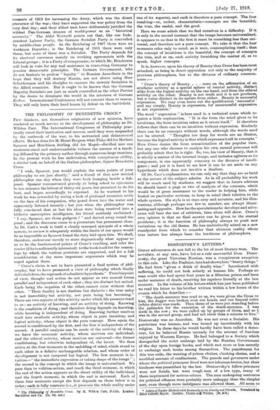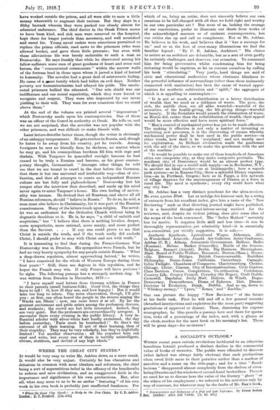DOSTOEVSKY'S LETTERS.*
GREAT adventures do not fall to the lot of most literary men. The novelists, at any rate, have led as a rule uneventful lives. Dosto- evsky, the great Victorian Russian, was a, conspicuous exception to this rule. Like the Psalmist, fate had shown him "heavy things." He had been "given a drink of deadly wine." Intoxicated with suffering, he could not look soberly at human life. Perhaps no man could who had spent four years in a Siberian prison and been under sentence of death, receiving his reprieve literally at the last moment. In the volume of his letters which has just been published we read his letter to his brother written within a few hours of the events which he describes :— "The death-sentence was read to us, we were given the Cross to kiss, the dagger was broken over our heads, and our funeral toilet (white shirts) was made. Then three of us were put standing before the palisades for the execution of the death-sentence. I was sixth in the row ; we were called up by groups of three, and so was in the second group, and had not more than a minute to live." Dostoevsky was no Anarchist. He was not even a Socialist. His patriotism was intense, and was bound up inextricably with his religion. In these days he would hardly have been called a demo- crat, for he believed Russia, unready for the amount of freedom enjoyed by Western Europe. He had belonged to a Society which disregarded the strict embargo laid by the Russian Government of the day upon foreign books, and which met more or less secretly to exchange such books among themselves. The punishment for this was exile, the wearing of prison clothes, clanking chains, and a modified amount of confinement. The guards and governors under whom the political prisoners lived were not inhuman brutes, but their kindness was prescribed by the law. Dostoevsky's fellow-prisoners were not fiends, but were rough men of a low type, many of thorn imprisoned for serious crimes. The men undergoing sentences for political offences were probably more unhappy than the simpler sort, even though more indulgence was allowed them. All seem to • Letters of Fpodor Michailovitch 1)ostoevek0 o his Family and Fritts*. Translated by Ethel Colburn Mayne. London: Chatto and Vilnius. [a. act.] have worked outside the prison, and all were able to earn a little money wherewith to augment their rations. But they slept in a filthy barrack wherein they were packed too closely almost for educated endurance. The chief doctor in the Omsk Prison seems to have been kind, and sick men were removed to the hospital, kept there for longer periods than necessary, and well nourished and eared for. Young naval cadets were sometimes permitted to replace the prison officials, read news to the prisoners (who were allowed books), and gave them little presents ; but even with these alleviations life was barely endurable to such a man as Dostoevsky. He says frankly that while he discovered among his fellow-sufferers some men of great goodness of heart and some real heroes, the "concentrated communism" within the narrow walls of the fortress bred in those upon whom it jarred a kind of hatred' to humanity. The novelist had a great deal of aristocratic feeling. He came of a sweat family which had fallen on evil days. Neither poverty nor humanitarianism had allayed his pride. The unedu- cated prisoners bullied the educated. "Our sole shield was our indifference and our moral superiority, which they were forced to recognize and respect. They were also impressed by our never yielding to their will. They were for ever conscious that we stood above them."
At the end of the volume are printed several " impressions " which Dostoevsky made upon his contemporaries. One of these was an officer of the Guard in authority at Omsk. He tells us, and we are not surprised, that the novelist was ,not popular with the other prisoners, and was difficult to make friends with.
Later letters describe better times, though the writer is obviously of an unhappy temperament. He gets restless in Russia, and, though he hates to be away from his country, yet he travels. Among foreigners he sees no friendly face, he declares, no matter where he may go, and his cosmopolitan brethren fill him with rage and disdain. With Turgenev he quarrelled outright because he had ceased to be truly a Russian and become, as his great contem- porary thought, Germanized. "Amongst other things, he told me that we are bound to crawl in the dust before the Germans, that there is but one universal and irrefutable way—that of civi- lization, and that all attempts to create an independent Russian culture are but folly and pigheadedness." Dostoevsky lost his temper after the interview thus described, and made up his mind never again to enter Turgenev's home. His own feeling of nation- ality was intense. He desired that all Russians, and above all all Russian reformers, should "believe in Russia." To do so, he said, a man must also believe in Christianity, for it was part of the Russian consciousness. Many of the letters touch upon religion. The novel- ist was an enthusiast for the Orthodox Church without being in dogmatic thraldom to it. He is, he says, "a child of unfaith and scepticism," but "I believe that there is nothing lovelier, deeper, more sympathetic, more rational, more manly, and more perfect than the Saviour. . . . If any one could prove to me that Christ is outside the truth, and if the truth really did exclude Christ, I should prefer to stay with Christ and not with truth."
It is interesting to find that during the Franco-German War Dostoevsky was in Dresden. His sympathies were French, but he had no very hearty sympathy for any people outside Russia. "What a deep-drawn repulsion, almost approaching hatred," he writes, "I have conceived for the whole of Western Europe during these four years ! " Still, there are degrees in this repulsion, and he hopes the French may win. If only France will have patience ! he sighs. The following passage has a strangely modern ring. It was written from Dresden in December, 1870 :— " I have myself read letters from German soldiers in France to their parents (small business-folk). Good God, the things they have to tell ! 0, how ill they are, and how hungry I But it would take too long to relate. One more observation, though, I'll give you : at first, one often heard the people in the streets singing the Wacht am Rhein' : now, one never hears it at all. By far the greatest excitement and pride exists among the professors, doctors, and students; the crowd are but little interested. Indeed, they are very quiet. But the professors are extraordinarily arrogant. I encounter them every evening in the public library. A very in- fluential scholar with silver-white hair loudly exclaimed, the day before yesterday, Paris must be bombarded ! ' So that's the outcome of all their learning. If not of their learning, then of their stupidity. They may be very scholarly, but they're frightfully limited ! Yet another observation : all the populace here can read and write, but every one of them is terribly unintelligent, obtuse, stubborn, and devoid of any high ideals."



































 Previous page
Previous page